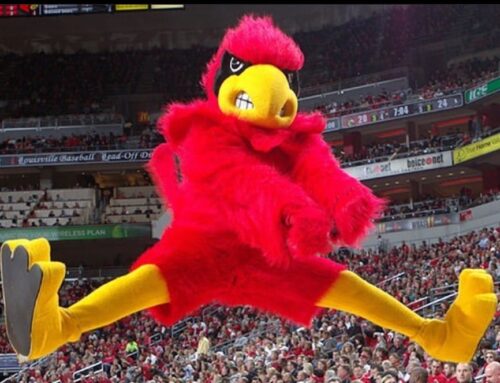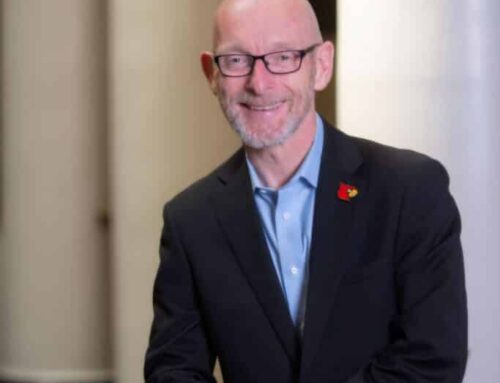A guy in the row ahead of me sipped a sweet-smelling bourbon. Its aroma filled the dark space around me. At a play about Kentucky, the smell just made sense.
A spotlight illuminated the stage, where a man flipped to a blurry photo on a projector screen. He began to tell his narrative, part of a larger intertwined story, beginning in Butchertown, Louisville. One by one, other characters took their turns in the spotlight, sharing intimate monologues about their roles in the story.
The play, “At the Vanishing Point,” premiered last night at Actors Theatre. Actors artistic director Les Waters directed the Kentucky-centered story, with accompaniment by musician Ben Sollee, who composed the score for the production.
Playwright Naomi Iizuka’s original rendition of “At the Vanishing Point” first ran in Actors Theatre’s annual Humana Festival in 2004. The production then went dormant for 10 years, before Waters picked it up and revised it to run in 2015.
“It was in the Humana Festival in ‘04, in an abandoned warehouse in Butchertown. It’s a play that Naomi and I always wanted to revisit, to look at again, and not just do it again, but change it. Some characters from the original one have disappeared altogether,” Waters said. “I really strongly believe in doing shows about the local community, and Butchertown is a great piece of this city’s heritage.”
The revived play’s set was constructed in neutral tones, including a grey warehouse that existed in the background, reminiscent of its 2004 run in Butchertown.
The subtle set complemented the profound simplicity of the entire production. Each character entered the stage independently, to tell his or her story. At first, I couldn’t make sense of the decision to create an entire play out of monologues, but as each person’s story became more clearly woven with the stories before and after it, I began to see the magic unfolding on the almost-bare stage.
Kentucky, a state of folklore-filled mountains and Ohio River ghosts, boasts an enduring oral tradition. People here really like to tell their stories—to tell how they are connected to this state, how they know your nextdoor neighbor or better yet, how they are probably related to him. “Vanishing Point” playwright Naomi Iizuka captured that integral part of our history in her choice to present the story in the narrative monologue form.
To localize the play even more, many of the lines included geographical references, like Frankfort Avenue or Melwood Avenue. The old Fischer’s Meat Packing Plant was also focal to each character’s narrative, and some of “Vanishing Point’s” most enthralling anecdotes and vibrant special effects paid homage to the flood of 1937 that drowned our centuries-old city for weeks. These details made “At the Vanishing Point” a play for Louisvillians alone, a humble move by Actors Theatre.
But perhaps the most subtly moving effect of “Vanishing Point” was Waters’ addition of Ben Sollee. Sollee’s original compositions faded into the monologues, making each word more enchanting than the one before it, as the lights dimmed to indicate each character’s impending exit.
“Ben’s music has changed the piece a great deal. He has made it very lyrical and very elegiac,” Waters said. “He’s not from Louisville, he’s from Lexington, but he’s identified with this state, and he’s part of the city’s independent music scene.”
Sollee’s approach reflected the local influence, even drawing inspiration from Lexington photographer Ralph Eugene Meatyard, whose photographs played a role in the show.
“I took the approach of trying to let the music play that role of being a horizon line, in a way, where you couldn’t quite tell where it began and ended, so it could continue that narrative of the vanishing point,” Sollee said. “And I’m a big an of Ralph Eugene Meatyard’s photographs, so I tried to take some of the aesthetics that are in his pictures of looking at things very closely, and letting things be out of focus and trying to let that play a role in not being specific melodies, but hints of melodies. I had a lot of fun trying things out for the play, and what stuck was the stuff that helped the story move along best.”
Aside from playing cello and singing, Sollee played himself, as a new character in the play. Sollee’s character wasn’t really a character at all, though, because he shared the real Sollee’s story. Onstage, Sollee—both the person and the character—played cello for a moment, and explained his family’s musical history. His dad played guitar back in the day, even opening for Iron Maiden. His mom, who was from Appalachia, liked to sing to him, and he played her voice on a cassette tape to invite the audience into that history.
‘You can hear the mountains in her voice,” Sollee said. “To this day, when I hear my mom sing, it’s like if home were a song.”
Poignant lines, like Sollee’s line above, riddled each monologue. Actress Wendy Stetson, who played Maudie Totten in the show, chose that second line as her favorite from the play. It was one of my favorites too.
Les Waters’ adaptation of “At the Vanishing Point” did what box office hits like “Valentine’s Day” and “New Year’s Eve” couldn’t even manage with an a-list cast and million-dollar budget, by tying together the loose ends of many peoples’ interconnected stories, and painting a compelling picture of one community from them all. Each character became a cog in the wheel of a greater narrative—that of this city’s rich history.
“I do think the show benefits from being seen more than once,” Sollee said. “I don’t say that to try to sell tickets, it’s just so intricate. Like if you saw it again, you could be like ‘oh, I know who they’re talking about now!’ at the beginning.
“At the Vanishing Point” is, indeed, a show I could watch many times and still pick out details I hadn’t noticed before, in the multi-layered script. Iizuka and Waters understood that being Louisvillian meant being connected to other Louisvillians by no more than three degrees of separation, and that understanding made “Vanishing Point” endearingly captivating.
“At the Vanishing Point” will be onstage at Actors Theatre through Feb. 15. Buy tickets here or call the box office at 502-584-1205.





